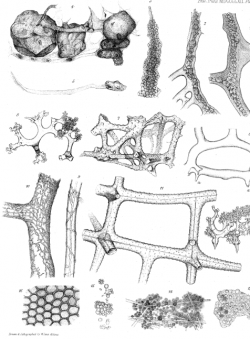Henry John Carter

Sponge structures drawn by W. Lens Aldous
- Born
- 8 August 1813
- Died
- 4 April 1895 (age 81)
Henry John Carter was a British army surgeon serving on Her Majesty's Indian Service from 1842. He also had a keen interest in zoology and geology, furthering our understanding of the geological regions of coastal India as well as the marine sponges living in these regions.
With an interest in medicine from a young age, Carter joined the Devon and Exeter Hospital as a student aged only 16. He pursued his medical training and eventually graduated from the prestigious Royal College of Surgeons in London in 1838.
Carter was appointed Surgeon in the Army of the East India Company and was sent to India in 1842 to serve on Her Majesty's Indian Service. While being stationed at various points around India, he started getting interested in the local geology and animal life. Carter published a number of papers detailing the geological landscape of Western India that helped develop Britain's understanding of the region.
While on his geological explorations, Carter also took an interest in the sponges growing around the Indian coast, particularly around Mumbai, the west and the south-east coast. He published several papers giving detailed descriptions of many of the sponges he found there which helped to further our understanding of these plant-like animals and their reproductive habits. His publications include the History of the Freshwater Sponges of Bombay and Zoosperms in Spongilla.
In 1859 Carter was elected a Fellow of the Royal Society, Fellow of the Bombay University (now Mumbai University) and the President of the Medical and Physical Society of Bombay. In recognition of his investigations, the Royal Society awarded him their Royal Medal in 1872 'for his long continued and valuable researches in zoology, and more especially for his inquiries into the natural history of the Spongiadae'. Spongiadae at the time was the family name for marine sponges.
[Spongilla carteri] a distinct species, which I have named after its discoverer, as a slight recognition of the good services he has rendered to science by his excellent and accurate observations.
J. S. Bowerbank, On the Anatomy and Physiology of the Spongiadae. Part II, 1862
A paralytic attack in 1888 left Carter with impaired vision and speech, and while he managed to live a relatively normal life afterwards he never fully recovered. He passed away in 1895, outlived by his wife and daughter



